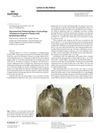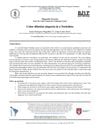 September 2016 in “Springer eBooks”
September 2016 in “Springer eBooks” Fat-derived stem cells may help treat skin aging and hair loss.
 24 citations,
January 2019 in “Science China Life Sciences”
24 citations,
January 2019 in “Science China Life Sciences” Chitosan/LiCl composite scaffolds help heal deep skin wounds better.
 January 2015 in “Springer eBooks”
January 2015 in “Springer eBooks” Fat-derived stem cells and their secretions show promise for treating skin aging and hair loss.
 4 citations,
January 2019 in “Annals of Dermatology”
4 citations,
January 2019 in “Annals of Dermatology” Higher levels of MiR-92a-1-5p and miR-328-3p found in female hair loss patients.
 3 citations,
January 2021 in “Skin appendage disorders”
3 citations,
January 2021 in “Skin appendage disorders” Hair color is not a risk factor for developing alopecia areata.
 5 citations,
January 2015 in “Skin appendage disorders”
5 citations,
January 2015 in “Skin appendage disorders” Colored hair-thickening fibers can help hide hair loss in some people with Epidermolysis Bullosa but may cause scalp irritation.

Bovines can have rare inherited skin diseases with specific symptoms like hair loss, fragile skin, and abnormal porphyrin buildup.
 July 2023 in “Journal of skin and stem cell”
July 2023 in “Journal of skin and stem cell” Interferon beta treatment in MS patients can cause skin reactions and increased hair loss.
 141 citations,
January 1984 in “Journal of The American Academy of Dermatology”
141 citations,
January 1984 in “Journal of The American Academy of Dermatology” Pregnancy can cause skin darkening, varicose veins, more sweating, hair growth, hair loss after birth, nail changes, and gum inflammation.
 46 citations,
December 2010 in “The journal of investigative dermatology/Journal of investigative dermatology”
46 citations,
December 2010 in “The journal of investigative dermatology/Journal of investigative dermatology” Disrupting Acvr1b in mice causes severe hair loss and thicker skin.
 2 citations,
March 2020 in “International Journal of Molecular Sciences”
2 citations,
March 2020 in “International Journal of Molecular Sciences” Topical treatments can deliver active molecules to skin stem cells, potentially helping treat skin and hair disorders, including skin cancers and hair loss.
 November 2021 in “Egyptian Journal of Medical Microbiology”
November 2021 in “Egyptian Journal of Medical Microbiology” COVID-19 protective measures led to skin irritation, hair loss, and brittle nails; using skin-friendly products and a healthy diet is recommended.
 27 citations,
March 2018 in “Biomaterials”
27 citations,
March 2018 in “Biomaterials” Three specific proteins can turn adult skin cells into hair-growing cells, suggesting a new hair loss treatment.
 139 citations,
February 2014 in “Journal of Advanced Research”
139 citations,
February 2014 in “Journal of Advanced Research” Vitamin D is important for skin health and may affect conditions like psoriasis and hair loss, but more research is needed to understand its role fully.
 12 citations,
July 2020 in “International Journal of Pharmaceutics”
12 citations,
July 2020 in “International Journal of Pharmaceutics” Iron oxide nanoparticles improve skin penetration and drug release for hair loss treatment.
 12 citations,
March 2020 in “Journal of Bioactive and Compatible Polymers”
12 citations,
March 2020 in “Journal of Bioactive and Compatible Polymers” Nanoparticles show potential for controlled release of hair loss drugs, improving treatment effectiveness.
 January 2024 in “Journal of dermatology and skin science”
January 2024 in “Journal of dermatology and skin science” Topical aprepitant reduces skin rash and hair loss caused by cancer treatment.
 November 2022 in “Brazilian journal of veterinary pathology”
November 2022 in “Brazilian journal of veterinary pathology” The Yorkshire terrier has a genetic hair loss condition not improved by treatment.
 3 citations,
August 2011 in “InTech eBooks”
3 citations,
August 2011 in “InTech eBooks” The document concludes that skin grafts are essential for repairing tissue loss, with various types available and ongoing research into substitutes to improve outcomes and reduce donor site issues.
 19 citations,
February 2008 in “Archives of Dermatological Research”
19 citations,
February 2008 in “Archives of Dermatological Research” Mast cells might contribute to hair loss by causing skin thickening.
 11 citations,
September 1997 in “Archives of Dermatology”
11 citations,
September 1997 in “Archives of Dermatology” Reduced androgens linked to kinky hair disorder and hair loss; 5a-reductase inhibitors may help.
 176 citations,
January 2003 in “Journal of Investigative Dermatology”
176 citations,
January 2003 in “Journal of Investigative Dermatology” Bone Morphogenetic Proteins (BMPs) help control skin health, hair growth, and color, and could potentially be used to treat skin and hair disorders.
 37 citations,
January 2013 in “Postepy Dermatologii I Alergologii”
37 citations,
January 2013 in “Postepy Dermatologii I Alergologii” Isotretinoin effectively reduces acne but causes dry skin, higher skin pH, more redness, and hair loss.
 92 citations,
August 2017 in “Proceedings of the National Academy of Sciences of the United States of America”
92 citations,
August 2017 in “Proceedings of the National Academy of Sciences of the United States of America” Newborn mouse skin cells can grow hair and this process can be recreated in adult cells to potentially help with hair loss.
 July 2015 in “Cambridge University Press eBooks”
July 2015 in “Cambridge University Press eBooks” Androgens like testosterone affect skin health and can lead to conditions such as acne and hair loss, with various treatments available.
 2 citations,
August 2019 in “International Journal of Applied Pharmaceutics”
2 citations,
August 2019 in “International Journal of Applied Pharmaceutics” Niosomes can effectively deliver Superoxide Dismutase to hair follicles, potentially helping prevent hair loss.
 1 citations,
July 2024 in “Skin Research and Technology”
1 citations,
July 2024 in “Skin Research and Technology” High-frequency ultrasound can effectively visualize and assess hair loss.
 1 citations,
April 2021 in “The journal of investigative dermatology/Journal of investigative dermatology”
1 citations,
April 2021 in “The journal of investigative dermatology/Journal of investigative dermatology” mTORC1 activity is important for hair growth and color, and targeting it could help treat hair loss and greying.
 23 citations,
September 2020 in “Journal of Cosmetic Dermatology”
23 citations,
September 2020 in “Journal of Cosmetic Dermatology” Injectable Platelet-Rich Fibrin (I-PRF) showed positive results for treating hair loss, skin texture, wrinkles, and wounds.
 3 citations,
June 1981 in “PubMed”
3 citations,
June 1981 in “PubMed” Taking hormonal contraceptives can cause skin changes, including hair loss, due to the effects of synthetic sex hormones.






























